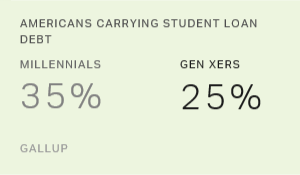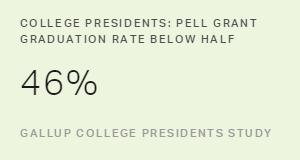In an era of rising tuition costs and increasing student loan debt, researchers continue to try to assign a value to an advanced degree. Most assess value by total cost of attendance, starting salaries and lifetime earnings, but very few ask graduates the most important questions: Was their degree worth the cost, and if they had to do it all over again, would they still get that degree? To evaluate the value of a law degree in an increasingly competitive market, Access Group commissioned Gallup to ask law school graduates these exact questions.
In 2015, Access Group and Gallup conducted a pilot study of law school graduates to better understand the value of a law degree. Gallup interviewed alumni of seven law schools: Campbell Law School, Elon Law, Mississippi College School of Law, Nova Southeastern University (NSU) Shepard Broad School of Law, Samford University's Cumberland School of Law, University of Richmond School of Law and Vanderbilt Law School. Gallup also analyzed data collected from a nationally representative sample of J.D. holders who were selected and interviewed as part of the Gallup-Purdue Index.
Rather than relying on traditional metrics of success, such as earnings and benefits, Gallup measured the value that J.D. holders assigned to their law school experience, along with their current well-being and employee engagement. Thirty-nine percent of J.D. holders from these seven law schools strongly agree that their degree was worth the cost, and this percentage increases dramatically among older graduates. Law school graduates who obtained their degrees between 1960-1979 and 1980-1999 were more likely than those who obtained their degree between 2000-2015 to strongly agree that their degree was worth the cost (75% and 50%, respectively, compared with 20%). Concurrently, graduates who obtained their degree between 1960-1979 and 1980-1999 were far more likely than those who obtained their degree between 2000-2015 to strongly agree that they would do it all over again (68% and 54%, respectively, compared with 37%).
The slightly less positive results for recent graduates may be because recent graduates have not fully realized the value of their degree. It may also be a direct reflection of the high amounts of student loan debt assumed by these graduates. On average, Access Group study participants borrowed over $70,000 in law school loans, a figure that increases precipitously among recent graduates, in addition to high amounts of undergraduate student loans incurred by these recent graduates. Further, law school graduates who obtained their degree between 2000-2015 entered an entirely different job market than their older peers, which has undoubtedly affected how they reflect on their degree.
Still, there remains good news for these young graduates. Nationally, J.D. holders lag other graduate degree holders in nearly all elements of well-being, with the exception of community well-being; however, they outperform those with a bachelor's degree only in all elements. J.D. holders also tie other graduate degree holders in their employee engagement, but exceed engagement rates among bachelor's degree holders.
Still, recent law school graduates are facing a competitive job market -- one that requires high-quality experiences at the graduate school level to prepare graduates for success in life after law school. Data collected during this study provide a blueprint for doing so. Law school graduates who experienced support in school and had a job or internship that allowed them to apply what they were learning in the classroom were 2.7 times more likely to be engaged at work and 2.1 times more likely to be thriving in all five elements of well-being. This competitive environment compels law schools to deliver unprecedented value to their students, given the high costs these students assume in pursuit of their degrees. Law schools that continue to assess the value they provide, as the seven participating law schools have, will serve as an example in higher education.
To read more about life after law school, read the full report.




